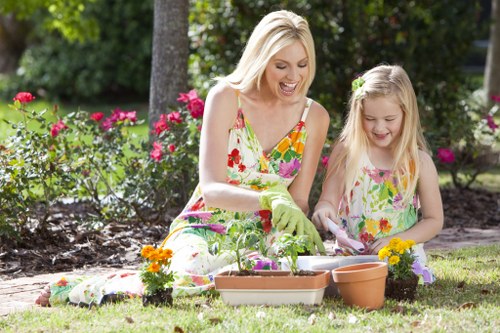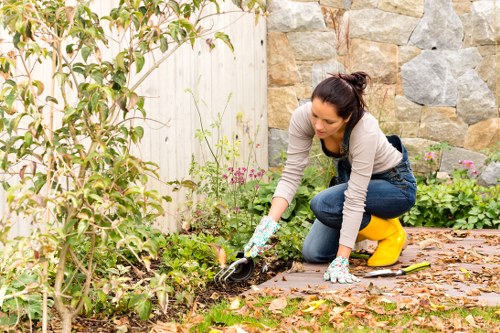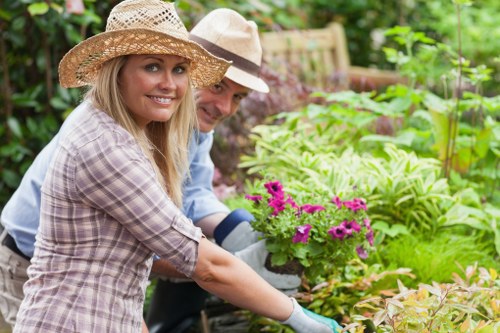Comprehensive Guide to Garden Maintenance in Surbiton
Introduction to Garden Maintenance in Surbiton

Maintaining a beautiful garden in Surbiton requires a blend of passion, knowledge, and the right techniques. Whether you’re a seasoned gardener or a beginner, understanding the unique climate and soil conditions of Surbiton can make a significant difference in the health and appearance of your garden.
Surbiton boasts a temperate maritime climate, which means mild winters and relatively cool summers. This climate is ideal for a variety of plants, but it also presents specific challenges that gardeners must navigate to keep their gardens thriving throughout the year.
In this article, we will explore essential garden maintenance tips, seasonal tasks, and professional services available in Surbiton to help you achieve a picturesque and well-maintained garden.
Seasonal Garden Maintenance

Spring Gardening Tips
Spring is a crucial time for garden maintenance in Surbiton. As the weather warms up, it’s the perfect opportunity to prepare your garden for the growing season. Start by clearing any debris accumulated over the winter months.
Planting new flowers and vegetables can add vibrant colors and fresh produce to your garden. Make sure to choose plants that are well-suited to Surbiton’s climate and soil conditions. Additionally, pruning any dead or overgrown branches will promote healthier growth.
Don’t forget to fertilize your plants to give them the nutrients they need to flourish. Regular watering is essential, especially for newly planted species.
Summer Garden Care

Maintaining Your Garden in the Heat
Summer brings longer days and warmer temperatures, which means your garden will need extra attention to stay healthy. Regular watering is crucial, particularly during dry spells. Consider installing a drip irrigation system to ensure consistent moisture levels without overwatering.
Weeding becomes more challenging in the summer as weeds grow rapidly. Make it a routine to remove weeds promptly to prevent them from taking over your garden beds.
Pest control is another important aspect of summer garden maintenance. Keep an eye out for common garden pests and take appropriate measures to protect your plants.
Autumn Garden Maintenance

Preparing Your Garden for Winter
As autumn arrives, it’s time to prepare your garden for the colder months ahead. Start by harvesting any remaining vegetables and flowers, then clean up garden beds by removing fallen leaves and spent plants.
Mulching is an excellent way to protect your plants’ roots from frost and retain soil moisture during winter. Choose organic mulches like bark or compost to enrich the soil as they decompose.
Pruning should continue in autumn, focusing on removing any diseased or damaged branches. This will help maintain the overall health of your trees and shrubs.
Winter Garden Tips

Maintaining Your Garden in the Cold
Winter garden maintenance in Surbiton involves protecting your plants from frost and extreme temperatures. Cover sensitive plants with frost cloths or garden fleece to shield them from the cold.
Continue to monitor your garden, clearing any accumulated snow or ice that may damage plants. It’s also a good time to plan for the next growing season by researching new plant varieties and garden layouts.
Take advantage of the quieter winter months to perform tasks like tool maintenance and garden planning. This preparation will set the stage for a successful gardening year ahead.
Essential Garden Maintenance Tasks
Regular Pruning and Trimming
Pruning is essential for maintaining the shape and health of your plants. Regular trimming encourages new growth and prevents overgrowth that can lead to disease.
Focus on removing dead or diseased branches, as well as any that are crossing or rubbing against each other. Proper pruning techniques vary depending on the type of plant, so it’s important to research or consult a professional when in doubt.
Soil Health and Fertilization
Healthy soil is the foundation of a thriving garden. Regularly test your soil to determine its pH and nutrient levels, and amend it as needed. Adding organic matter like compost can improve soil structure and fertility.
Fertilizing your plants provides them with essential nutrients and promotes vigorous growth. Choose the right fertilizer based on your plants’ specific needs and avoid over-fertilizing, which can lead to nutrient burn and environmental issues.
Weed Control Strategies
Weeds compete with your plants for essential nutrients, water, and light. Implementing effective weed control strategies is crucial for maintaining a healthy garden.
- Mulching: Apply a layer of mulch to suppress weed growth and retain soil moisture.
- Hand Weeding: Regularly remove weeds by hand to prevent them from establishing deep roots.
- Organic Herbicides: Use eco-friendly herbicides to manage persistent weed problems without harming your plants.
Plant Selection for Surbiton Gardens
Choosing the Right Plants
Selecting plants that are well-suited to Surbiton’s climate and soil conditions is key to a successful garden. Consider native species that are adapted to the local environment and require less maintenance.
Perennials provide long-lasting beauty and can reduce the need for replanting each year. Annuals, on the other hand, offer vibrant colors and variety but require more frequent planting.
Seasonal Flower Beds
Creating seasonal flower beds ensures that your garden remains colorful throughout the year. Plan your flower beds to include a mix of spring, summer, autumn, and winter blooms.
- Spring: Tulips, daffodils, and crocuses
- Summer: Roses, lavender, and sunflowers
- Autumn: Chrysanthemums, asters, and marigolds
- Winter: Hellebores and winter pansies
Professional Garden Maintenance Services in Surbiton
Why Hire a Professional?
While DIY garden maintenance can be rewarding, hiring a professional service in Surbiton offers numerous benefits. Professional gardeners have the expertise, tools, and experience to handle complex garden tasks efficiently.
They can provide tailored maintenance plans that suit your garden’s specific needs, ensuring optimal health and aesthetics. Additionally, professionals can save you time and effort, allowing you to enjoy your garden without the hassle of constant upkeep.
Services Offered
Garden maintenance services in Surbiton typically include:
- Lawn mowing and edging
- Pruning and trimming
- Weed control
- Planting and transplanting
- Soil testing and fertilization
- Garden design and landscaping
- Seasonal cleanup
Choosing the Right Service Provider
When selecting a garden maintenance service in Surbiton, consider factors such as experience, reputation, and the range of services offered. Look for providers who are knowledgeable about local plant species and climate conditions.
- Check reviews and testimonials
- Ask for references
- Ensure they are insured and licensed
- Inquire about their maintenance plans and pricing
Eco-Friendly Garden Practices
Sustainable Gardening Techniques
Adopting eco-friendly gardening practices not only benefits the environment but also enhances the health of your garden. Sustainable techniques focus on reducing waste, conserving resources, and promoting biodiversity.
Composting
Composting transforms kitchen scraps and garden waste into nutrient-rich soil amendments. This practice reduces landfill waste and provides your plants with organic nutrients.
Rainwater Harvesting
Collecting rainwater for garden use minimizes reliance on municipal water supplies and reduces water bills. Install rain barrels or a rainwater harvesting system to efficiently capture and store rainwater.
Natural Pest Control
Instead of using chemical pesticides, opt for natural pest control methods. Encourage beneficial insects like ladybugs and lacewings, which prey on common garden pests.
Organic Gardening
Organic gardening avoids synthetic fertilizers and pesticides, focusing on natural methods to promote plant health. This approach leads to healthier soil, reduced chemical runoff, and a more resilient garden ecosystem.
- Use organic fertilizers such as compost or worm castings
- Implement crop rotation to prevent soil depletion
- Adopt companion planting to enhance plant growth and deter pests
DIY Garden Maintenance Tips
Basic Tools Every Gardener Needs
Having the right tools is essential for effective garden maintenance. Invest in quality tools that are comfortable to use and suited to your garden’s specific needs.
- Pruning shears
- Lopers for cutting thicker branches
- Spade and shovel
- Garden fork
- Hose with adjustable nozzle
- Wheelbarrow for transporting materials
Effective Weed Management
Weed management is a continual task in garden maintenance. Employing a combination of manual removal and preventive measures can keep weeds at bay.
- Regularly inspect and remove weeds by hand
- Apply mulch to suppress weed growth
- Use landscape fabric in pathways and garden beds
- Implement a pre-emergent herbicide if necessary
Proper Watering Techniques
Proper watering is crucial for plant health. Overwatering can lead to root rot, while underwatering can stress plants and stunt their growth.
- Water early in the morning to reduce evaporation
- Use soaker hoses or drip irrigation for efficient water delivery
- Check soil moisture regularly and adjust watering schedules accordingly
- Avoid watering the foliage to prevent fungal diseases
Lawn Care in Surbiton
Maintaining a Healthy Lawn
A lush, green lawn is a cornerstone of garden beauty. Proper lawn care involves mowing, fertilizing, aerating, and addressing pests and diseases promptly.
Regular Mowing
Mow your lawn regularly to maintain an even height and encourage dense growth. Adjust the mower height based on the season; higher mowing heights in summer can help shade the soil and retain moisture.
Fertilization and Aeration
Fertilizing your lawn provides essential nutrients that promote healthy growth. Aerating the soil helps improve water and nutrient penetration, reducing compaction and enhancing root development.
Pest and Disease Control
Monitor your lawn for signs of pests and diseases. Early detection and treatment are key to preventing widespread damage. Use eco-friendly treatments whenever possible to protect beneficial insects and the environment.
Overseeding for Lawn Renewal
Overseeding involves planting grass seed over existing turf to fill in bare spots and improve lawn density. This practice enhances the lawn’s resistance to weeds, improves its appearance, and ensures a thicker, healthier turf.
- Choose grass varieties suited to Surbiton’s climate
- Prepare the soil by raking and removing debris
- Distribute seed evenly and cover lightly with soil
- Water regularly to promote germination
Landscape Design and Enhancements
Creating an Attractive Garden Layout
Thoughtful landscape design can transform your garden into a stunning outdoor space. Consider the layout, plant selection, and focal points to create a harmonious and visually appealing environment.
Incorporating Hardscaping Elements
Hardscaping features such as patios, pathways, and walls add structure and functionality to your garden. These elements provide areas for relaxation, dining, and navigation, enhancing the overall usability of your outdoor space.
Adding Water Features
Water features like fountains, ponds, and waterfalls introduce a soothing element to your garden. They attract wildlife, create focal points, and contribute to a tranquil atmosphere.
Garden Lighting
Proper lighting showcases your garden’s beauty during the evening hours and adds safety to walkways. Use a combination of ambient, task, and accent lighting to highlight key areas and create a welcoming ambiance.
Enhancing Biodiversity
A diverse garden attracts a variety of wildlife, including birds, bees, and butterflies. Planting a mix of flowers, shrubs, and trees creates habitats that support local ecosystems.
- Choose native plants to support local pollinators
- Provide water sources for wildlife
- Include flowering plants that bloom at different times
- Install birdhouses or insect hotels
Common Garden Challenges in Surbiton
Dealing with Pests and Diseases
Gardeners in Surbiton may encounter various pests and diseases that can threaten their plants. Identifying and managing these issues promptly is crucial for maintaining a healthy garden.
Common Pests
Some common garden pests in Surbiton include aphids, slugs, snails, and caterpillars. These pests can damage plants by feeding on leaves, stems, and roots.
- Aphids: Use natural predators like ladybugs or apply neem oil as a treatment.
- Slugs and Snails: Set up traps or use barriers like crushed eggshells to deter them.
- Caterpillars: Introduce beneficial insects or use organic pesticides if infestations become severe.
Plant Diseases
Fungal diseases such as powdery mildew and root rot can affect a wide range of plants. Preventative measures, including proper spacing and watering practices, are essential to reduce the risk.
- Powdery Mildew: Improve air circulation and avoid overhead watering.
- Root Rot: Ensure well-draining soil and avoid overwatering.
- Bacterial Infections: Remove and destroy affected plants to prevent the spread.
Weather-Related Challenges
Unpredictable weather can pose challenges to garden maintenance. Heavy rains can lead to soil erosion and plant damage, while unexpected frosts can harm tender plants.
Soil Erosion Prevention
Implementing ground cover plants and using mulch can help prevent soil erosion caused by heavy rains. Terracing and building retaining walls are also effective strategies for managing sloped gardens.
Frost Protection
Protect your plants from unexpected frosts by using covers like frost cloths or blankets. Focus on insulating sensitive plants and ensuring they have adequate protection during sudden temperature drops.
Tools and Equipment for Garden Maintenance
Essential Gardening Tools
Having the right tools can make garden maintenance tasks easier and more efficient. Equip yourself with the following essential tools:
- Pruning Shears: Ideal for trimming small branches and shaping plants.
- Loppers: Suitable for cutting thicker branches that regular shears can't handle.
- Spade and Shovel: Essential for digging, planting, and soil aeration.
- Garden Fork: Useful for turning soil and removing weeds.
- Wheelbarrow: Helps transport soil, plants, and garden waste.
- Hose with Adjustable Nozzle: Provides controlled watering for different gardening needs.
Maintaining Your Tools
Proper maintenance of your gardening tools ensures their longevity and effectiveness. Clean your tools after each use to remove dirt and prevent rust.
- Sharpen blades regularly to maintain cutting efficiency.
- Oil metal parts to prevent corrosion.
- Store tools in a dry, sheltered area to extend their lifespan.
- Inspect tools for damage and repair or replace them as needed.
Advanced Gardening Equipment
For larger gardens or more intensive maintenance tasks, consider investing in advanced gardening equipment:
- Lawn Mower: Essential for maintaining a neat and even lawn.
- String Trimmer: Helps keep edges and hard-to-reach areas free of grass.
- Leaf Blower: Efficiently clears leaves and debris from garden paths and beds.
- Power Pruner: Makes trimming large branches quicker and easier.
Gardening for Different Spaces
Small Gardens and Urban Spaces
Even with limited space, you can maintain a beautiful garden in Surbiton. Small gardens and urban spaces benefit from smart design and efficient maintenance practices.
Vertical Gardening
Vertical gardening maximizes space by utilizing walls, fences, and trellises to grow climbing plants and hanging containers. This approach adds greenery without taking up valuable ground space.
Container Gardening
Container gardening is perfect for patios, balconies, and other small areas. Choose a variety of containers in different sizes and shapes to create a visually appealing and manageable garden.
Compact Plant Varieties
Select compact and dwarf plant varieties that are well-suited to small spaces. These plants require less space to grow while still providing beauty and functionality to your garden.
Large Gardens and Estates
For those with larger gardens or estates in Surbiton, maintenance involves additional tasks and considerations to keep the expansive space orderly and thriving.
Hedging and Screening
Maintaining large hedges and screens provides privacy, defines garden boundaries, and adds structure to your landscape. Regular trimming and shaping are necessary to keep hedges dense and healthy.
Multiple Planting Zones
Divide your large garden into different planting zones based on plant types, sunlight exposure, and water requirements. This organization simplifies maintenance and ensures each area receives appropriate care.
Special Features Maintenance
Large gardens often include special features such as ponds, statues, and pergolas. Regular maintenance of these elements ensures they remain attractive and functional parts of your garden.
Creating a Sustainable Garden
Benefits of Sustainable Gardening
Sustainable gardening practices contribute to environmental conservation, reduce your ecological footprint, and create a healthier garden ecosystem. Embracing sustainability leads to long-term benefits for both your garden and the planet.
Composting and Soil Health
Composting is a cornerstone of sustainable gardening. It recycles organic waste into valuable compost, enhancing soil fertility and structure without relying on chemical fertilizers.
- Set up a compost bin in your garden
- Add kitchen scraps, leaves, and grass clippings regularly
- Avoid adding meat, dairy, or oily foods to prevent pests
- Turn the compost pile periodically to aerate and speed up decomposition
Water Conservation Techniques
Implementing water conservation techniques ensures that your garden thrives even during dry periods. Efficient water use is crucial in maintaining a sustainable garden.
- Use mulch to retain soil moisture and reduce evaporation
- Install rain barrels to collect and store rainwater
- Implement drip irrigation systems for targeted watering
- Choose drought-tolerant plant varieties that require less water
Encouraging Wildlife and Biodiversity
A diverse garden attracts various forms of wildlife, creating a balanced and resilient ecosystem. Promoting biodiversity enhances pollination, pest control, and soil health.
- Plant native species that provide habitat and food for local wildlife
- Include a variety of plant types and flowering times
- Provide water sources like birdbaths and ponds
- Avoid using pesticides that harm beneficial insects
Conclusion and Next Steps
Summary of Garden Maintenance in Surbiton
Effective garden maintenance in Surbiton involves a combination of seasonal tasks, proper plant selection, and sustainable practices. By understanding the local climate and soil conditions, you can tailor your maintenance efforts to ensure a beautiful and healthy garden all year round.
Whether you choose to undertake maintenance yourself or hire professional services, the key is consistency and attention to detail. Regular care and thoughtful planning will transform your garden into a serene and vibrant outdoor space.
Take Action Today
Ready to elevate your garden maintenance routine? Contact us today to explore professional garden maintenance services in Surbiton or book your service now to start enjoying a well-maintained and stunning garden.